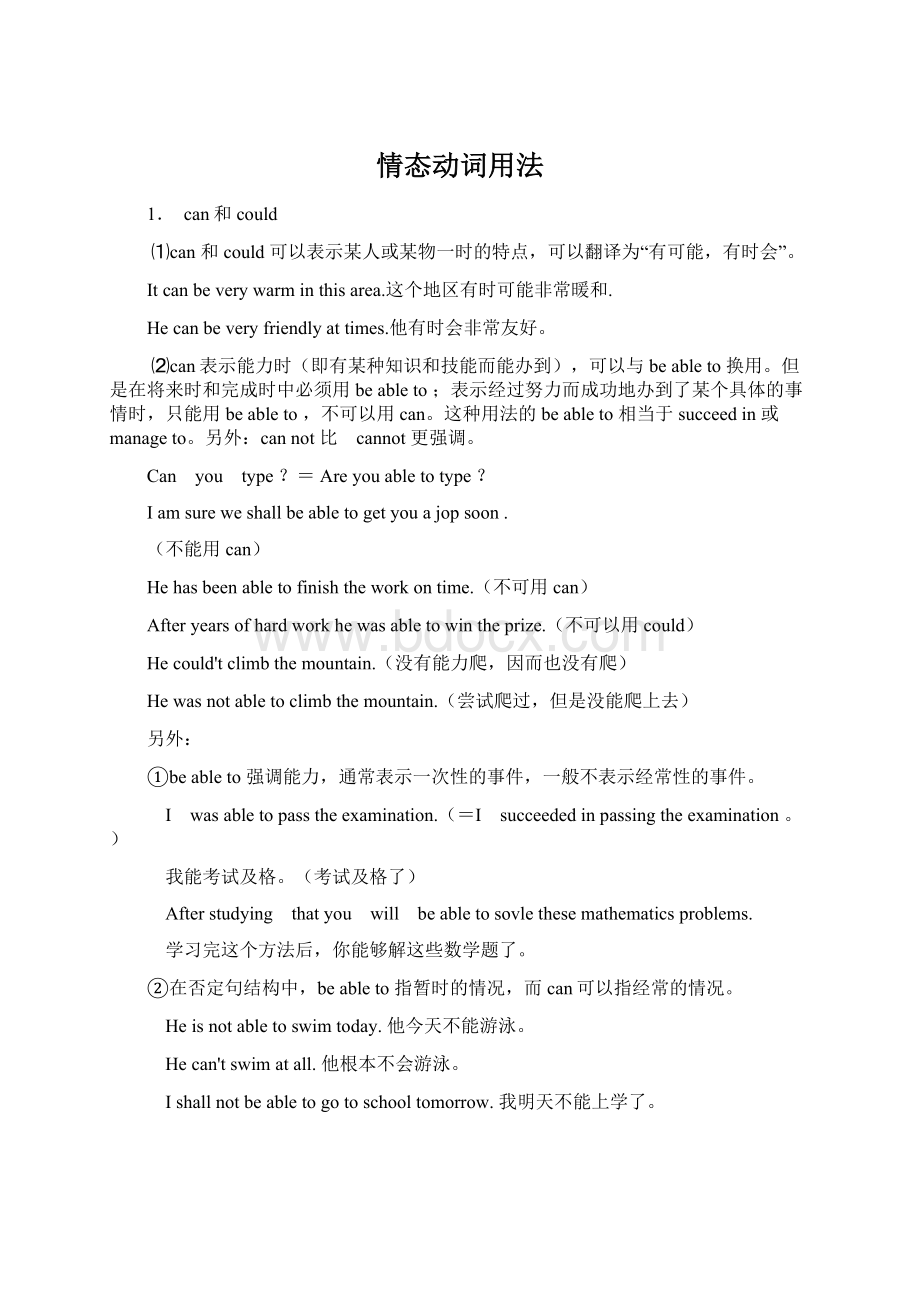情态动词用法Word文档下载推荐.docx
《情态动词用法Word文档下载推荐.docx》由会员分享,可在线阅读,更多相关《情态动词用法Word文档下载推荐.docx(11页珍藏版)》请在冰豆网上搜索。

②在否定句结构中,beableto指暂时的情况,而can可以指经常的情况。
Heisnotabletoswimtoday.他今天不能游泳。
Hecan'
tswimatall.他根本不会游泳。
Ishallnotbeabletogotoschooltomorrow.我明天不能上学了。
③在表示“经过尝试或努力为能做到”的意思时,一般不用beableto。
如对Wereyou abletofindthepen?
做否定回答应该用:
No,I couldn'
t(findit).不能说:
No,I wasn'
table
tofindit.
④could可以用来表示过去习惯性动作的完成,而wasableto却没有这种用法。
Icouldrun aftera busandcatchittwentyyearsago,Ican'
tdothatnow.
二十年前,我能在后面跑着追上公共汽车,现在不行了。
⑤cannot/can'
t与too/over(‐)/enough/perfectly/sufficiently等词连用,意思是“越…越…”“无论怎样… …也不为过”、“决不会… …够(过)”。
You can'
tpraisehimtoomuch.你无论怎样称赞他都不过分。
You cannotbeovercareful.你越细心越好。
I can'
tthankyou enough.我对你感激不尽。
Thispointcannotbeoveremphasized.这一点无论如何强调都不过分 。
注释:
⑴can'
t/cannot…too/enough等中的not,也可以用never/hardly/scarcely等代替。
There can never betoo much deceptioninwar。
兵不厌诈。
Wecanhardly/scarecelypaytoohighapriceforliberation.
为了解放,我们无论付出多高的代价也不为过。
⑵can'
t/cannot……too/enough等后的附加疑问句的动词用肯定形式can,不用can'
t。
Youcan'
tpraisehimtoomuch,canyou?
你无论怎样赞扬他都不为过,对吧?
Youcannotbetoocareful,canyou?
你再小心也不为过,对吧?
⑶“cannotwait不定式”意思是“beeagerto……急于做”,表示强调的肯定意思。
Icannotwaittoreadthebook。
我非常渴望读这本书。
Hecouldn’twaittoseeher。
他渴望见到她。
练习题:
Pleaseremindyourgrandpa totake medicineontime,foramanofhisage_______beveryforgetful。
A.should B.must C.shall D.can
Youcannotbe_______carefulwhenyoudriveacar.
A.veryB.soC.tooD.enough
Thecarbrokedownontheway,butwe_____getoutofthedesertatlast.
A.mightB.wouldC.wereabletoD.could
2.
must有一种含义:
“偏要”“硬要”。
表示说话人对句子主语所发出的动作或行为是不希望的、不满的甚至是生气的。
通常指令人不愉快的事情。
must用于第二人称时,常常含有讽刺挖苦的意思:
Whymustyoubesostubborn(固执)?
Hemustcomeandworryherwithquestions,justwhenshewasbusycookingthedinner.
Ifyoumustsmoke,atleastyoucoulduseanashtray(烟灰缸).
AsIwassittingdowntolunch,theelectricbellmustring.
Whymustyoubesolate?
你为何非要这么晚来呢?
Why_______youalwaysinterruptme?
A.canB.willC.mayD.must
Naturally,afterItoldherwhattodo,mydaughter_______goanddotheopposite.
A.mayB.canC.mustD.should
另:
⑴haveto多表示习惯动作或客观条件索引出的义务;
而must则用于表示一种重要或急迫的事情:
Wehavetocarefortheyoung.(义务)
Shehastobeattheofficebefore8everyday.(习惯)
Youmustgotothemanageratonce,oryou'
llbediamissed.
(急迫的事情)
⑵通常haveto强调客观需求,表示因客观环境或事态促使而不得不作某事;
must强调主观看法,表示主观上认为有必要做谋事。
Imustlearnanotherlanguage.(主观想法:
Iwantto)
Ihavetolearnanotherlanguage.(客观需求:
身为一个外交官)
但是must可以表示客观必然性,意思为“必然(会),总是会”,而haveto则不可以这样用。
Allmenmustdie.人固有一死。
Competitionmusthappen.竞争总会发生。
Truthmustbeout.真相总会大白。
Wintermustbefollowedbyspring.
冬天到了,春天还会远吗?
Theremustbeadayforrevenge.总有报仇的那一天。
⑶对must所在句子变反意疑问句时,应注意以下习惯搭配:
①must作“必须”解时,反意疑问句中重复must。
Allthechildrenmustrespecttheirparents,mustn’tthey?
孩子必须尊敬父母,对吗?
②must作“有必要”解时,反意疑问句中用need。
Wemusttellherthetruth,needn’twe?
我们现在有必要告诉她实情,对吗?
③“mustbe”表示推测时,反意疑问句用be的适当形式。
Youmustbethirsty,aren’tyou?
你一定渴了,是吗?
④“musthavedone”表示推测时,附加疑问句一般用have或has,但是有明确表示过去的时间壮语(before除外)时,反意疑问句用过去时态。
Hemusthavefinishedthework,hasn’the?
Hemusthavegoneabroadlastweek,didn’the?
Youmusthavebeentouldaboutitthatday,weren’tyou?
⑤mustn’t表示“禁止,不允许”时,反意疑问句一般用may。
Thechildrenmustn’tplaywithfire,maythey?
也可以用must。
Wemustn’tbelate,must/may?
我们不可以迟到,对吗?
⑥must用于表示询问对方意向时,反意疑问句部分的动词可以与前面陈述句部分的动词不一致。
Youmustcometomorrow,willyou?
Youmustn’ttellittoyourmorther,_______?
A.mustyouB.doyouC.needyouD.willyou
-----Thestudentsmusthandintheirtermpapersinaweek,_______?
-----No,they_______。
A.needn’tthey,mustn’tB.mustn’tthey,mustn’t
C.mustn’tthey,needn’tD.shouldn’tthey,should
3.usedto的意思是“过去常常”,已经含有always,often,sometimes,fromtimetotime等意思,但是它却可以和它们连用。
Healwaysusedto/usedalwaystocomebybus。
他过去总是坐公共汽车来。
Heoftenusedtoworklateatnight.他过去经常工作到深夜。
Shealwaysusedtogetupatfouro'
clockinthemorning.
她过去总是早晨4点起床。
但是usedto不可以与表示具体次数或一段时间(即特定的时间段)的词语连用。
Hewenttoabroadthreetimes.
Helivedinthecountrysideforthreeyears.
但是可以和过去确定的时间壮语连用。
Heusedtoliveherein1995.
Heusedtobedevotedtoherwhenshewasalittlegirl.
Inthosedaysweusedtoliveinthecountry.
would和usedto的区别如下:
两者都可以表示过去的习惯性动作。
但是would只强调过去特定情况下的习惯性动作(由动态动词表示),单纯的过去和现在无关;
而usedto即可以强调过去的习惯性动作(由动态动词表示),也可以强调过去的事实或状态(由静态东此表示),且与现在形成对比,即可表示持续的状态,也可表示过去重复的行为。
Iusedtohaveanoldcar.过去我有一辆旧轿车。
Ididn'
tusetolikeopera,butnowI'
mgettinginterested.
我过去不喜欢歌剧,但现在逐渐有了兴趣。
上面两句话的动词均是静态动词,说明过去的事实或状态,不能用would代替usedto。
注:
woud和usedto一样,都不可用来表示发生的次数,也不能与表示一个特定的时间段的状语连用。
HewenttoLomdonthreetimeswhenhewasachild.他还是孩子时,去过伦敦三次。
但是would可以和sometimes/nowandthen/fromtimetotime等词组(表示过去有时或偶尔的时间状语)连用。
Shewouldsitthereforhourssometimes,doingnothingatall.
他有时一连坐好几个小时,什么事情也不干。
练习题:
Whenhewasthere,he_______gotothatcoffeeshopatthecornerafterworkeveryday.
A.wouldB.shouldC.hadbetterD.might
4.shall可以用在第二、三人称,要重读,不可以缩写,表示说话人的意图、意志、允诺、命令、命运或必然结果等;
在法律、条约、协定等文件中可以表示义务、规定等。
Youshallhavealotofmoney.(意图/允诺)你会有很多钱的。
Eachcitizenshallcarryhisidentificationcardwhentravelling.(规定)
旅游时每个市民务必带上身份证。
Youshallarrivetherebeforesunset.(命令)你们要在日落前到达那儿。
Ifyoudon'
tbehaveyourself,youshallbepunidhed.(威胁)
如果你行为不轨的话,你会受到惩罚的。
ThetaskshallbefinishedbySunday.
(允诺)任务会在星期天前完成的。
Heshallgetwhathedeserves.(警告)他会得到他应该得到的。
Deathiscertaintoall;
allshalldie.
(命运)死必临万物;
万物皆必死。
Betterdaysshallsoonfollow.(预言)好日子不久会来到。
Thetimeshallcomewhentheyshallbeavenged.
(意志)为他们伸冤的时候会来的。
Whotouchespitchshallbedefiled.(必然结果)玩火者必自焚。
POWsshallnotbeill-treated.(法律用语)战俘不得受虐待。
ThenewregulationshalltakeeffectonMaythefirst.
(规定)新章程自五月一日起实施。
Ithasbeenannouncedthatcandidates_______remainintheirseatsuntilallthepapershavebeen
collected.
A.canB.willC.mayD.shall
Haven`tItoldyoualreadythatyou_______havemyanswertomorrowmorning?
A.willB.shallC.shouldD.would
Nobody_______throwawayrubbisheverywhere!
A.canB.needC.shallD.must
5.will
⑴表示意愿或固执坚持。
用于非人主语时,表示固有性质,倾向。
Shewon'
tlendmethemoney.她不愿把钱借给我。
Heisthemanwhowillgohisownway.他是一个自行其事的人。
Thewindowwon'
topen.窗子打不开。
Thedoorwon'
tshut.门关不上了。
⑵在含有if从句的主从复合句中,如果if引导的条件状语从句表示的是一般将来时或过去将来时,
不能用will或would,而要用一般现在时或一般过去时来代替。
Ifyoudon'
tcomehere,Iwillgotofindyou.
但是will可以用在if从句中表示各种“愿望”,包括“请求,意愿,拒绝,同意,允许,能够,
坚持,选择,计划”等。
Ifyouwillcomeintothehall,themeetingwillbeginsoon.
请求)请到大厅里来,会议马上开始了
Ifyouwillmakeanothertry,Ishalldoeverythingpossibletohelpyou.
(意愿)如果你愿意再试一次的话,我愿近一切可能帮助你。
Ifhewion'
tgowithyou,Ishallasksomebodyelse.
(拒绝)如果他不肯同你一起去的话,我将另找人。
Ifyouwllagreewithme,Ishalltellyoueverythingaboutit.
(同意)如果你同意我的观点,我将把一切都告诉你。
Ifyouwillcomelateagain,Ishallletyouin.
(允诺)如果你答应不再迟到,我就让你进去。
Ifanyonewillfindacuretothedisease,itwillbeawinder.
(能够)如果有人能够治好这种病,那将是一个奇迹。
Ifyouwilldoitlikethat,youwillfail.(坚持)坚持那样做,你就会失败。
Ifyouwillbuybread,Ishallbuybeer.(选择)如果你买面包,我就买啤酒。
Ifyouwon'
tlendmoneytohim,pleaseletmeknow.
(计划)如果你不打算借钱给他,让我知道。
下面句子中的will表示“难免”。
Accidentswillhappen.事故难免会发生。
Boyswillbeboys.男孩子总是男孩子。
⑶will可以用来表示某些根据自然规律必定会发生的事情,并且此时可以用一般现在时来代替它。
Oilwillfloatonwater.油能在水上漂流。
Ifthepurewaterisheatedto100°
C,itwillboil.
(可以用boils).
如果纯净的水加热至100°
C,它就会沸腾。
Stainlesssteelwillnotrust.不锈钢是不会生锈的。
Matcheswillnotstrikeiftheyaredamp.火柴如果潮湿,就划不着。
Onlyinsummer________.
A.willtheicemeltB.theicewillmeltC.theicecanmeltD.theicemelts
Ifyou_______waitamoment,I´
llgotoseeifMr.Johnsisfree.
A.shallB.willC.wouldD.need
6.need
⑴作为情态动词时主要用在否定句和疑问句中,但是也可以用在用条件的肯定句中,这个条件是:
肯
定句中必须含有某些含某种否定含义的词语,例如only,but,all,before等或者说句子中暗含某
种否定含义。
Oneneedonlyconsiderthefacts.否定含义是:
只需考虑这些事实,不必去做别的事。
Heneeddoitbutonce.否定含义是:
他不必做两次以上。
Allheneeddoisstatehisopinionclearly.
否定含义是:
只要清楚地陈述自己的观点,他不必做任何事。
Tobecomeamemberofthecivicassociation,oneneedonlyattendthreemeetings,and
________hisfeesregularly.
A.payB.topayC.payingD.paid
⑵didn'
tneedto和needn'
thavedone的区别:
前者表示没有必要做实际上也没有做某事,后者表示做了不该做的事情。
Theydidn'
tneedtocomehere.他们不必来这儿(实际也没来)。
Theyneedn'
thavecomehere.他们本来不必来这儿(但是实际来了)
Theydidnotneedtoarrivesoearly.他们不必很早到达。
Shewastoonervoustoreply,butfortunatelyshedidnotneedtosaynothing.
她紧张的无法答话,但是幸运的是她什么也不需要说。
Youneedn'
thavetoldthemthat.你本不必把这件事情告诉他们。
①You______suchalongessay,theteacheronlyaskedfor300words,andyouhavewritten600words.
A.mustn'
thavewrittenB.needn'
thavewritten
C.ddn'
thavetowriteD.didn'
needtowrite
②You_